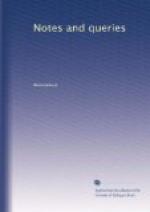“By those who have not been led to consideration or inquiry upon the subject, this may be deemed a mere speculation; but those who are even slightly acquainted with the real state of things, will, I believe agree with me that if men, respectable and in earnest and moderately informed, would only set about the matter, they would soon be astonished at the ease and rapidity with which they would accumulate interesting and valuable matter. Transcribing and printing, it is admitted, are expensive processes, and little could be effected by them at first; but merely to make known to the world by hasty, imperfect, even blundering, lists or indexes, that things unsought and unknown exist, would be an invaluable benefit.”
We pass over the section on Correspondence, and that on the establishment of Provincial Societies; but from the last, On the Privileges of Members, we quote at even greater length.
“It is but honest to confess in plain terms, that the chief and most obvious privilege of members at first, is likely to be little more than a satisfactory belief that they are doing a good work, and serving their generation. In a word, the nicely-balanced quid pro quo is not offered. It might be prudent for the present to confine one’s self to a positive assurance that the Society will, at the worst, make as good a return as several other societies formed for the promotion and cultivation of other branches of knowledge. If subscribers will only be content to pay as much, and receive as little, as the fellows of the Royal and Antiquarian Societies, the Church-History Society will thrive. But considering the nature and object of the proposed Society, I cannot help expressing my confidence that there are many Christian people who will give their money freely, and no more wish to have part of it returned, than if they had put it into a plate at a church-door—let them only be satisfied that it will not be embezzled or turned into waste paper.
“At the same time, the members of the Society might derive some legitimate benefits. They would have constantly increasing advantages from the use of their library, which would gradually become, not only rich in books, but in transcripts, catalogues, indexes, notices, &c., not to be found together elsewhere. Of all these they would have a right to as much use and advantage as joint-proprietors could enjoy without hindrance to each other. With regard to works published by the Society, they might reasonably expect to be supplied {372} with such as they should choose to possess, on the same terms as if they were the authors, or the owners of the copyright. These, however, are details which, with many others, must be settled by the managers; they are not mentioned as matters of primary importance or inducement.”
DR. MAITLAND concludes by observing, that he should not have ventured to publish his plan, had he not




